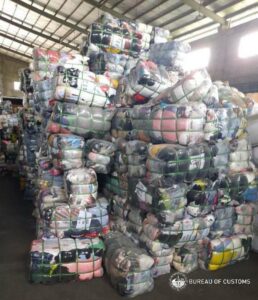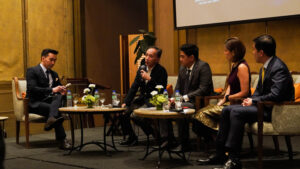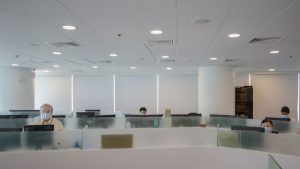Senator proposes legalization of ‘ukay-ukay’

By Alyssa Nicole O. Tan, Reporter
A SENATOR raised the possibility of legalizing the commercial importation of secondhand garments amid the proliferation of stores illegally selling “ukay-ukay” around the country.
“I think it’s about time, if the Bureau of Customs (BoC) can’t control the importation of ukay-ukay, we make them pay taxes so that the government can earn from this in some way,” Senator Rafael T. Tulfo said in mixed English and Filipino during a Ways and Means Committee hearing on Tuesday.
He questioned the Customs bureau over widespread smuggling of secondhand garments, commonly referred to as ukay-ukay. Republic Act (RA) No. 4654 prohibits commercial importation of used clothing.
“We have been implementing measures against smuggling. In fact, as we heighten and intensify our efforts against smuggling, the smugglers also become more innovative,” Customs Deputy Commissioner Edward James D. Buco told during the hearing.
Mr. Buco noted that several shipments of secondhand clothing have been seized this year, and cases were filed against importers.
However, Mr. Tulfo said that even if BoC fails to detect shipments of secondhand clothes, they should conduct follow-up operations when they see thrift shops.
Senate Ways and Means Committee Chairman Sherwin T. Gatchalian said Customs should coordinate with local government units to address smuggling of secondhand clothing.
“Local governments might not even be informed that these types of operations are not within the bounds of the law,” he said.
Mr. Gatchalian said it may be time to revisit RA 4654, which prohibits imports of used clothing and rags to safeguard public health and the nation’s dignity.
“We cannot fault the retailers for selling ukay-ukay because I don’t think they know it’s illegal. In fact, many of the retailers pay business permits but they sell ukay-ukay,” he added.
Senator Pia S. Cayetano, who heads the Senate Sustainable Development Goals (SDG), Innovation and Futures Thinking Committee, said secondhand clothing promotes “responsible consumption.”
However, she noted some garments might be unusable and are merely thrown away.
Rizal Commercial Banking Corp. Chief Economist Michael L. Ricafort said the taxation of secondhand clothing would help the government generate much-needed revenues.
However, he said many retailers and manufacturers would be hurt by the influx of cheap, used clothing.
“There may be businesses or industries that may be adversely affected by increased competition from these imports such as clothing or apparel manufacturers that may have reservations or opposition in terms of possible job or other business losses,” he told BusinessWorld in a Viber message
“There have also been allegations that some of these have been repurposed or rechanneled from donations or charity, thereby presenting some possible loopholes or complications such as risks of misdeclaration among other issues, as being part of the underground economy,” he added. This will pose a challenge for proper documentation and declaration of imported items.
Domini S. Velasquez, chief economist at China Banking Corp., is not in favor of legalizing imports of secondhand clothing.
“If there are lapses specific to ukay-ukay, these will have to be reviewed and addressed by the proper authorities,” she said told BusinessWorld in a Viber message. “In terms of conducting business within the country, the Bureau of Internal Revenue and LGUs are the proper units that should ensure that businesses pay appropriate taxes.”
John Paolo R. Rivera, an economist at the Asian Institute of Management, said stringent Customs regulations are needed.
“Before you can implement the tax policy, supporting regulations have to be imposed first,” he told BusinessWorld in a Viber message. “Taxing them might require additional layers of policy implementation like business registration and permits. If this cannot be considered, it might be another tax policy that will have issues with collection,” he added.




